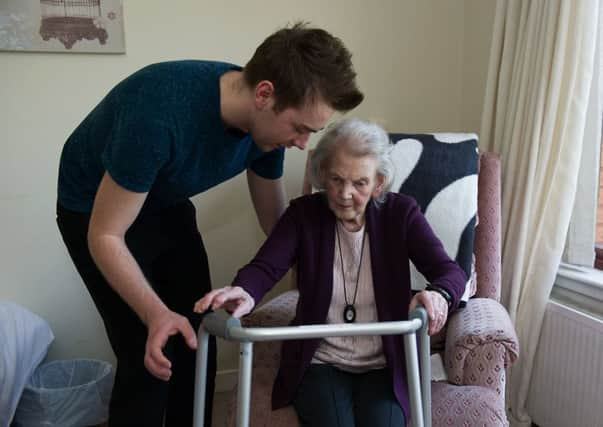Why we must all think about cost of caring for Scotland’s ageing population – Helen Martin


Alzheimer Scotland launched a Fair Dementia Care Commission, chaired by former First MInister Henry McLeish. Their findings include that people with dementia suffer “inequality” compared to those with other progressive and terminal conditions.
Anyone with £28,000 in assets is forced to pay for social and care funding with the average weekly care home fee of £870 (roughly £4,000 a month) leaving many forced to sell their own homes. They help subsidise council-funded residents who pay only £637. Although to be fair to Scotland, up to £253 in public funds go weekly to those eligible for personal and nursing care.
Advertisement
Hide AdAdvertisement
Hide AdThe Commission declares that the social care model for those with dementia fails to meet health needs and Government action is vital and necessary.
It’s true. Dementia care doesn’t seem to be treated like any other terminal illness. But other issues are arising now.
I questioned what I described as five-star, hotel-type care homes with cinemas, champagne bars, brasseries etc, asking why that would be required or good for residents with dementia.
Then last week, Scotland’s first Care Home Celebration Day occurred, established by Scottish Care. Chief Executive Dr Donald Macaskill agreed to an interview and explained how care home needs and functions have changed.
“Ten to 15 years ago, people went into care homes for long periods. Now the vast majority are unable to live independently by the time they move in, have reduced capacity and need consistent mental and physical care.
“Of the 62,000 who will die in 2030, at least 40,000 will die in care homes – which will become the equivalent to hospices in the heart of the community.”
Dr Macaskill also appreciated the need for increasing these private, self-funding, more expensive, “high end” homes.
“There are many affluent, elderly people who don’t like loneliness, their families may have moved away, or they can’t cope with cleaning and cooking etc, yet they still have mental capacity and ability and have a right to pay for stimulating, friendly accommodation with cafes, bars, cinemas, etc. We are seeing more of these high-end care homes – well-staffed and also coping with end-of-life and palliative care.”
Advertisement
Hide AdAdvertisement
Hide AdThe problem is the “fork in the road” which depends on money. As Dr Macaskill explains, in affluent cities such as Edinburgh and Aberdeen, it becomes harder for poorer, public-funded elderly to find a room in “ordinary” care homes. Even those run by charities need many more self-funders to help subsidise a few council-funded residents. All that is less of a problem in Glasgow, Dundee and Inverness.
Even comfortably-off people in their 50s and 60s are spending more, sometimes all, of their savings supporting mature children as well as their own parents.
Both Scottish Care and the Fair Dementia Care Commission say the whole subject should be debated and are campaigning to treat elderly people, especially with dementia, correctly; more taxation, government input, community and society involvement, voluntary roles, more expert staff, and a raising of the reasonably high standards even current care homes meet.
The sixty-four-dollar question is, can Scotland afford to meet that challenge?
A plce to ban banana skins
DISCARDED banana skins litter tourist paths to the top of Ben Nevis with voluntary “cleaners” collecting four kilos a day.
The idiots who scatter them believe them to be healthy fodder and biodegradable. Despite my allergy to bananas, I know their worst effect on everyone is slides and tumbles.
That’s not the best thing to leave on the UK’s highest mountain path!
Why dog owners should back a ‘leash law’
AS Holyrood is considering a radical overhaul of dog control to stop dogs attacking children, I’d include the risk of them attacking other dogs, cats, or anyone else.
Advertisement
Hide AdAdvertisement
Hide AdThere are a large proportion of owners who think their pet should be free to walk off the lead anywhere – on a public pavement or a main road, in a public park, around neighbourhood streets, or on country lanes next to livestock. Our placid dog is only ever off the lead in the house, garden, or in a confined, fenced off area. Obedient farm, sheep or police dogs are exceptions. Dogs off-lead and free to attack may well be ordered to be destroyed. That’s surely not what any owner wants. Some US states have the “leash law” applying everywhere except the owner’s property. That’s the answer.
